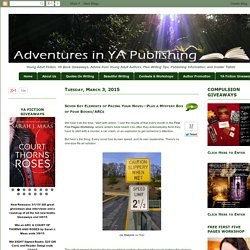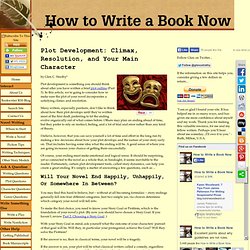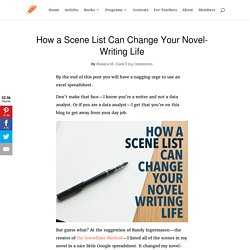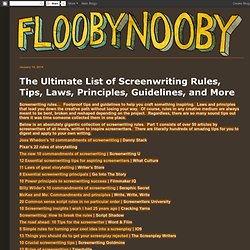

Elements of Suspense in Writing: 6 Secret to Creating and Sustaining Suspense. Thriller writing?

Mystery writing? Literary fiction? Seven Key Elements of Pacing Your Novel. We hear it all the time, “start with action.”

I see the results of that every month in the First Five Pages Workshop, where writers have heard it so often they automatically think they have to start with a murder, a car crash, or an explosion to get someone’s attention. But here’s the thing. Every novel has its own speed, and its own readership. There's no one-size fits all solution. The critical aspect of pacing for any novelist is control—knowing why you’re making the choices you’re making and knowing how those choices will affect your readers. This week's giveaway: Compulsion was long-listed for the SIBA Book Award from the Southern Independent Bookseller's Alliance this week, so I'm in the mood to celebrate.
Enter below. Horror Authors: How to Scare the Heck Out of Your Readers. Novel Writing Help. 25 Things You Should Know About Plot. Previous iterations of the “25 Things” series:

How To Create An Intriguing Inciting Incident. Every single element between the first page and the very last page of a screenplay is arguably the most important, salable thing about it.

In this article, the beginning of the plot takes the number one spot. However, the plot really can’t begin being awesome until it is set in motion. That’s where the inciting event comes in. A good plot is everything that transpires in the screenplay and, if it’s captivating, will have an equally captivating inciting event. But good inciting events don’t come easy. First, the reader/audience has to care about the character they’re following. Even if the main character isn’t all that interesting, the situations or surroundings that make up their world can be what keeps the audience engaged. Now that we have a good starting point, we have to make the inciting event big. In Star Wars: Episode IV, the inciting event is Luke Skywalker discovering that his family has been killed. Plot Development: How to write the climax and ending of your novel. By Glen C.

Strathy* Plot development is something you should think about after you have written a brief plot outline (Part 3). In this article, we're going to consider how to make sure the plot of your novel incorporates a satisfying climax and resolution. Many writers, especially pantsers, don't like to think about how their plot develops until they've written most of the first draft, preferring to let the ending evolve organically out of what comes before. Others may plan an ending ahead of time, but they prefer to rely on instinct, feeling, and a lot of trial and error rather than any kind of theory.
I believe, however, that you can save yourself a lot of time and effort in the long run by making a few decisions about how your plot develops and the nature of your story early on. Of course, your ending must make emotional and logical sense. Will Your Novel End Happily, Unhappily, Or Somewhere In Between? If the answer is no, then in classical terms, your novel will be a tragedy. 1. 2. 3. Fight Scenes 101. 100 Little Ways You Can Dramatically Improve Your Writing. 25 Things Every Writer Should Know.
An alternate title for this post might be, “Things I Think About Writing,” which is to say, these are random snidbits (snippets + tidbits) of beliefs I hold about what it takes to be a writer.

I hesitate to say that any of this is exactly Zen (oh how often we as a culture misuse the term “Zen” — like, “Whoa, that tapestry is so cool, it’s really Zen“), but it certainly favors a sharper, shorter style than the blathering wordsplosions I tend to rely on in my day-to-day writing posts. Anyway. Peruse these. Writing Emotions VISUALLY by OokamiKasumi on deviantART. Fiction Writing Tips. How a Scene List Can Change Your Novel-Writing Life. By the end of this post you will have a nagging urge to use an excel spreadsheet.

Don’t make that face—I know you’re a writer and not a data analyst. Or if you are a data analyst—I get that you’re on this blog to get away from your day job. But guess what? At the suggestion of Randy Ingermason—the creator of the Snowflake Method—I listed all of the scenes in my novel in a nice little Google spreadsheet. It changed my novel-writing life, and doing the same will change yours too. Creating a scene list changed my novel-writing life, and doing the same will change yours too. Scene Lists Help You Plan I tried to write a novel once before without planning in advance.
I used the Snowflake Method, which consists of several steps to designing a novel that we can discuss at a later date. The Ultimate List of Screenwriting Rules, Tips, Laws, Principles, Guidelines, and More. SOURCE: Lover of the Dark15 General Tips (1) Tell a great story Nothing matters if you don’t have a great story worth telling.

A tale you are passionate about. A screenplay worthy of your creativity and devotion. Periodic Table of Storytelling.